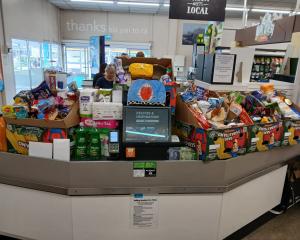An exporter selling New Zealand-made infant formula in China has been shocked by the swiftness with which sales fell through the floor after news of an agricultural chemical's presence in Kiwi milk products broke in the Chinese media last week.
Simon Page, co-founder of Auckland's Biopure Health, said the debacle over the nitrate inhibitor dicyandiamide (DCD) had been a public relations disaster for our dairy industry and the Government needed to take more action to convince consumers in the world's second biggest economy that this country remains a safe source of milk.
"There is an opportunity to enhance our world-leading food safety reputation by inviting Chinese officials to New Zealand to explain what the DCD product is, where it was applied and reassure that no contaminated milk will reach China," said Page.
"An accompanying film crew should document the trip for Beijing to broadcast across state news channels."
Biopure Health had seen its turnover doubling every week since the firm opened its network of New Zealand Milk Bar retail stores in China's Sichuan province last year, Page said.
But he said sales promptly went "to zero" when customers found out about the presence of small amounts in DCD in New Zealand dairy products after the publication of a Wall Street Journal article that questioned the safety of this country's milk.
Customers had even been returning formula to stores and asking for refunds, Page said.
Statements such as "NZ milk is poisonous" and "Chinese-made milk free from DCD" had been made in the Chinese press, alarming consumers still spooked by the melamine scandal which left six babies dead and thousands more sick after the toxic industrial chemical entered China's milk supply in 2008.
Chinese retailers had been hiking prices for French, Dutch and Australian-made infant formula because of demand as consumers became wary of buying New Zealand-made products, Page said.
He said sales of Biopure Health's Infapure formula had picked up since the Ministry of Primary Industries released an announcement clarifying issues around DCD on Sunday, which resulted in more "level headed" Chinese media coverage, but they still had not returned to normal levels.
Fonterra has been criticised for failing to address the issue when the presence of DCD first became known late last year, but the company has since taken steps to ease the concerns of Chinese consumers.
Fonterra chief executive Theo Spierings has said he supported the voluntary suspension of DCD sales by the chemical's two manufacturers in this country, Ravensdown and Ballance Agri-Nutrients, and said the minute traces of the chemical found in samples of dairy products were 100 times lower than acceptable levels under European food safety limits.
He said he was "absolutely not concerned" about the potential effect on Fonterra and the company's sales had not been impacted.
The Ministry of Primary Industries said DCD did not present a food safety issue and the withdrawal of the chemical from sale meant it could not enter New Zealand's milk supply.
Carol Barnao, MPI's deputy director of general standards, said New Zealand's ambassador to China, Carl Worker, held a press conference in China yesterday regarding DCD. A top Fonterra executive and a Chinese agricultural expert were also there.
Page said a more strategic approach needed to be taken when major dairy industry-related announcements were made.
Fonterra Shareholders Fund units have dropped 3.5 per cent since last week, closing down 8c at $7.05 last night.
- Christopher Adams of the New Zealand Herald











